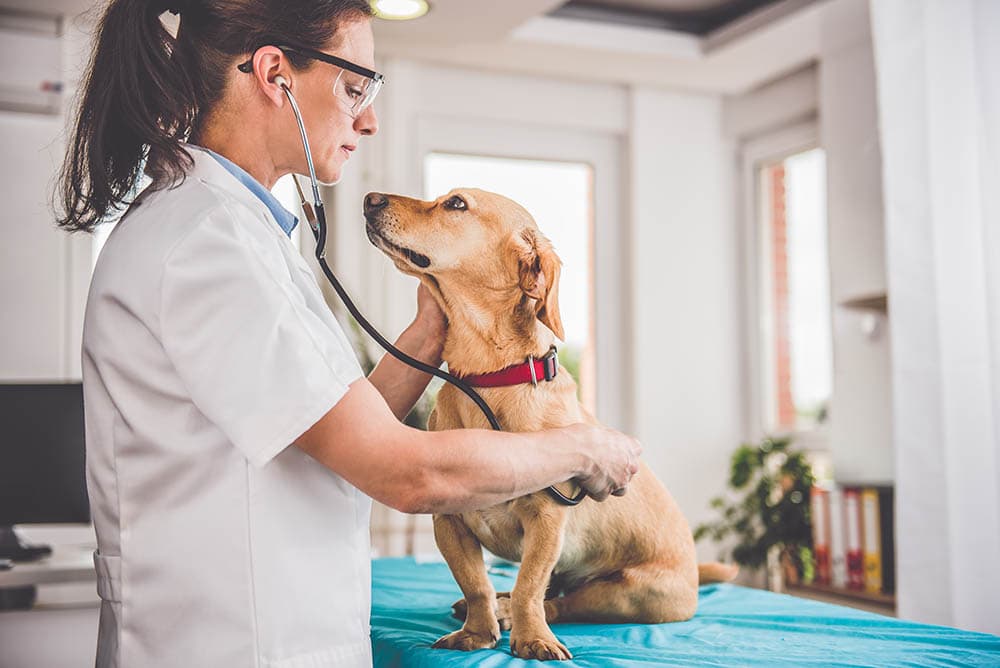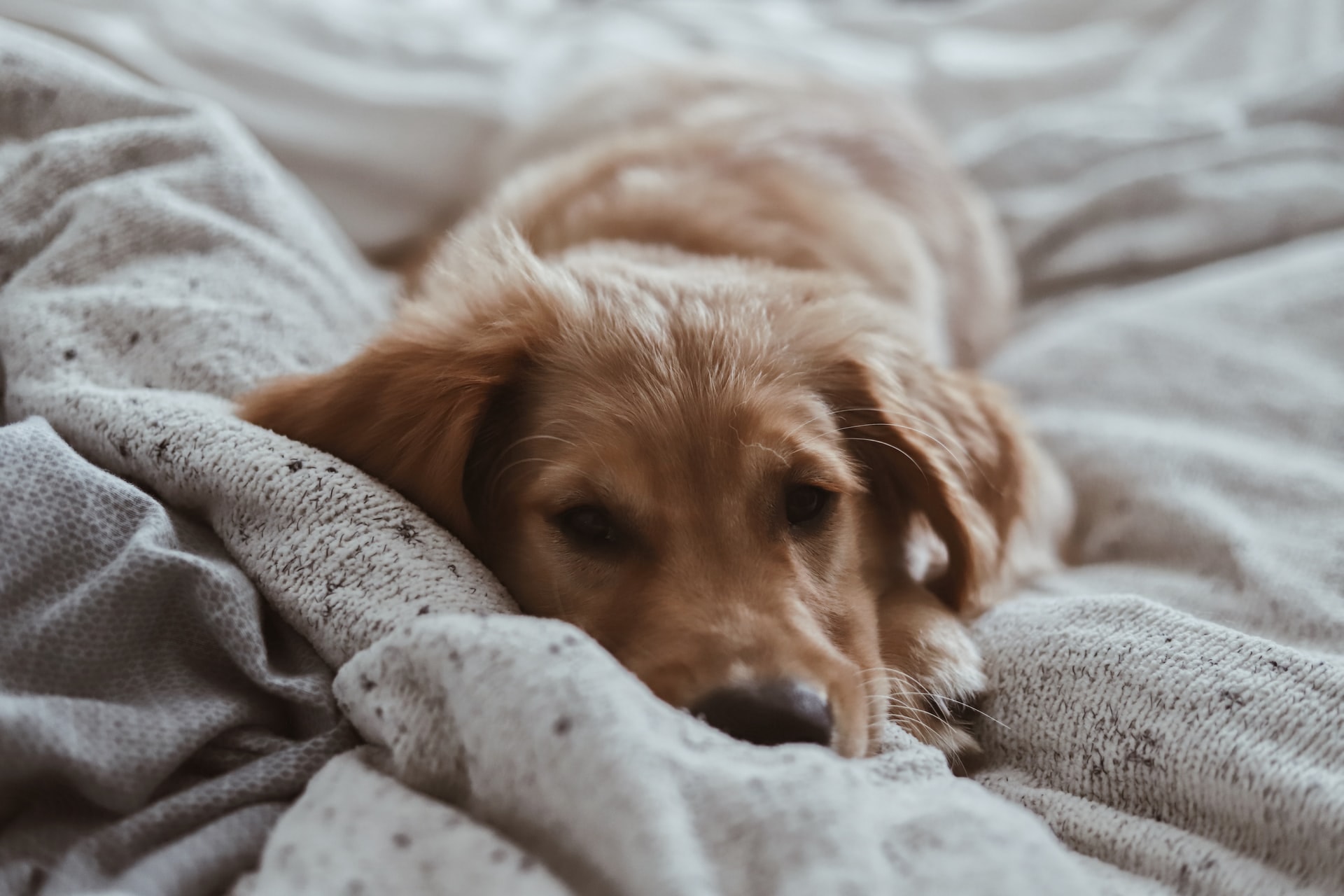It can be both frustrating and alarming when your trained dog begins to frequently pee on their blanket. A sudden change of behavior in your dog is often an indication that something is wrong health-wise. However, if your dog was recently adopted or is still a puppy, the reasons are most likely quite simple and relatively easy to remedy.
Either way, it’s important to understand why your dog is peeing on his blanket, both for your peace of mind and, most importantly, to ensure that your dog is happy and healthy. If you think your dog has underlying health issues, it’s better to have them seen by a veterinarian quickly so that they can start treatment to improve the situation.
In this article, we’re going to discuss the various reasons why your dog may be peeing on his blanket and what you can do to turn the situation around.
The 7 Reasons Why My Dog Pee’s on His Blanket?
1. Urinary Tract Infection
The pain and discomfort from a urinary tract infection (UTI) can result in your dog peeing in places they normally wouldn’t, such as on their blankets. A UTI isn’t uncommon in dogs and, if treated, can clear up quickly. It can sometimes dissipate on its own but if it worsens, your dog may end up with more severe health issues.
UTIs arise when bacteria get into the bladder, entering from the urethra. It doesn’t occur from poor dog parenting and you’re not to blame, but you should take your dog to see the vet if you notice the following signs in your furry friend:
- Frequent urination
- Dripping urine
- Urine that has a strong smell
- Straining to urinate
- Painful urination
- Blood in the urine
- Licking of genitals
- Excessive drinking
2. Spinal Cord Disease
Medically known as degenerative myelopathy, this disease affects the dog’s spinal cord and results in the loss of body function, including control over urinating. This disease doesn’t have a known cause but typically is more common in older dogs. If your older dog has been peeing on his blanket and other uncommon areas, it might be an early sign of spinal cord disease.
If you notice other signs such as muscle spasms, pain, loss of sensation, and weakness of limbs, your dog may have this terrible condition. It’s vital that you take them to the vet as soon as possible so that they can do the necessary tests and provide the treatment your dog needs.
3. Arthritis
Arthritis is a painful condition that affects your dog’s joints. It makes getting up, walking around, and other simple tasks difficult. Not only might you find that your dog has been urinating on their blanket where they sleep, but you may see a change in their emotional behavior too. Your dog may be irritable or more reserved than usual.
Other signs that accompany arthritis in dogs are swollen, stiff joints, strange walking movements, reluctance to do activities, and lameness in their legs.
4. Diabetes
Many dogs suffer from diabetes, which is a metabolic disorder where the body either doesn’t produce the correct amount of insulin or doesn’t use insulin the way it should.
Some factors that increase the risk of diabetes in dogs are if they’re overweight, have been on steroid medication, have the genetics for it, or are older. However, many other factors can increase your dog’s risk.
One of the early signs of diabetes in dogs is urinating in areas they have been trained not to. Your dog will frequently urinate. That’s when accidents start to happen, especially on things they spend much of their time on—such as their blanket.
Other early signs that’ll accompany frequent urination are increased thirst, weight loss, and an increased appetite. It is highly important that you get your dog to the vet if you notice these signs. Leaving this issue will have dire effects on your dog.
5. Emotional Issues
If your dog is feeling anxious, stressed, sad, or fearful, a common accident that may occur is urination. Loud, unfamiliar noises, such as thunder or fireworks, can cause your dog to urinate where they are—in this case, on their blanket. Being shouted at or having a new person or baby in the house can also cause stress or anxiety and result in accidental urination.
If your dog is anxious over something that’s happening or has recently happened, it’s not likely that they’ll break their potty training long-term. It’ll either happen in that stressful moment or throughout that same day.
If the behavior persists, your dog may be suffering from PTSD, which could occur from a vicious attack, an earthquake, abandonment, or seeing a disturbing event.
6. Marking

Regardless of your dog’s age, if they feel threatened by a new pet or person, they may pee on their blanket. However, this behavior is most common in young males. Dogs typically prefer not to urinate on their belongings, but they may do so in an attempt to keep a new pet away from their blanket.
You don’t need to be alarmed if your dog marks occasionally. It’s their way of letting both people and animals know that what is theirs is theirs.
7. Your Dog Is a Puppy or Recently Adopted
Puppies have tiny bladders and aren’t great at holding their pee in. When they’re young and haven’t been taught to pee outside yet, they’re going to go wherever they are, and their blanket won’t be an exception.
As you train your puppy to pee outside, you’ll notice fewer accidents occurring on their blanket, but it takes time. You need to have a lot of patience and offer plenty of praise when they do get it right.
If your dog has recently been adopted and frequently urinates on their blanket, you may need to start potty training with them. They may never have received the love and patience needed for training before and may not have learned to pee outside. They may also pee where they shouldn’t due to emotional issues. With much love, patience, and care, you’ll notice the issue subside and stop altogether.
Preventing Your Dog from Peeing on His Blanket
As we discussed, there are many different reasons why your dog may be peeing on their blanket. It may be a lack of training, emotional issues, marking, or something wrong with their health. Here are some points to consider if your dog is peeing on their blanket or around the house.
Give Positive Reinforcement
Although finding pee on your dog’s blanket is frustrating because you have to continually clean it, it’s important to praise your dog when they do something right—like peeing outside. Shouting at your dog could make the “accidental” peeing worse because they’ll feel anxious, fearful, and lose trust in you. It may heighten their already anxious nature.
Take Your Dog to the Vet
If your older dog has suddenly started breaking training, acting out of character, or showing other concerning signs along with urinating on their blanket, you should take them to the vet. You know your dog’s personality and behavior best and will know if something is wrong. Trust your instinct and get them checked out rather than waiting it out.
Your vet can do tests on your dog to determine if they have any underlying health issues. If they find something, they’ll let you know the best treatment plan for them.

Reinforce or Start Potty Training
If your dog is healthy in mind and body and has been potty trained before, it might be time to reinforce it. Potty training doesn’t always last, and they may need a bit of a reminder on what they should be doing. If you’re struggling with dominance issues, you may need to call in a trainer to work with you and help you with training.
As mentioned above, puppies don’t come potty trained, and you’ll need to train them right away. A newly adopted dog may never have received training or may be struggling with the change and need a bit of time. Show them love, patience, and praise as you introduce them to their new lifestyle.
Final Thoughts
If you have a young or newly adopted dog, they’re most probably peeing on their blanket because they haven’t been trained not to do so. If peeing on the blanket is a new behavior, it may be a sign of an illness, and you need to take your dog to a vet to get them checked. The final and most likely reason is that your dog is simply marking their territory.
Remember to be stern with your dog when potty training them, but also note that positive reinforcement is always the best training tool.
Featured Image Credit: Amy Humphries, Unsplash












